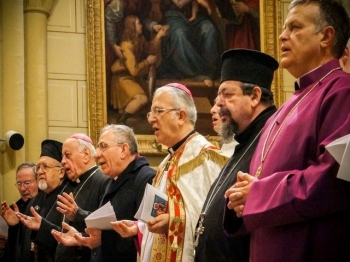Praying for Christian unity in the Holy Land
 Week of Prayer for Christian Unity 2014 in the Holy Land. Copyright: Andres Bergamini
Week of Prayer for Christian Unity 2014 in the Holy Land. Copyright: Andres Bergamini
From January 18 to 25 the Week of Prayer for Christian Unity is celebrated. In the Holy Land, the week will be held January 21 to 29 beginning as every year after January 19, the date our Armenian brothers and sisters celebrate Christmas. Jesuit Father David Neuhaus, who is responsible for the pastoral care of migrants and Hebrew-speaking Catholics for the Latin Patriarchate of Jerusalem, shares with a reflection with us on this theme which is central for the Church especially in the Holy Land.
“For the love of Christ urges us on, because we are convinced that one has died for all; therefore all have died.
And he died for all, so that those who live might live no longer for themselves,
but for him who died and was raised for them” (2 Corinthians 5:14-15).
Throughout the Christian world, ecumenism, the attempts to promote Christianity unity and heal the wounds of separation, are afoot. In the Holy Land, there are many forms of division among Christians. The most visible is the division among different Christian denominations, Eastern, Orthodox, Catholic, Protestant and Evangelical. However, one of the deepest divides are among Christians who identify with different sides in the ongoing wars that tear the Holy Land apart. The challenge of unity is not only to bring the denominations together but also to foster an awareness that Christians have a unique role to play because they are situated on all sides.
There are different kinds of ecumenism in the Holy Land today:
- Ecumenism of solidarity: A strong motor in ecumenical relations among Christians in the Holy Land is their shared circumstances. Whereas theological, religious and historical causes for division often seem abstract and distant, the need for unity is underlined because of the shared struggle to survive. Ecumenical encounter often deals more with occupation, discrimination and religious fundamentalism than it does with the causes for Christian division. This type of ecumenism has led to the weaving of closer relations among Christians as awareness grows that what we have in common is much greater than what divides us.
- Ecumenism of piety: A very different kind of ecumenism is inspired by the focus on specifically Christian themes. Some see their faith as a refuge from the world outside. Christians come into the religious space to escape conflict and submerge themselves in religious language and practice in order to create distance from their surroundings. This is often the tendency within traditional Christian communities that see the world as a threatening kingdom of darkness and the Christian community as shedding some light and offering some consolation.
- Prophetic ecumenism: Some disciples of Christ are engaging in a new form of ecumenism that might be called “prophetic ecumenism”. “For (Christ) is our peace; in his flesh he has made both groups into one and has broken down the dividing wall, that is, the hostility between us. He has abolished the law with its commandments and ordinances, that he might create in himself one new humanity in place of the two, thus making peace, and might reconcile both groups to God in one body through the cross, thus putting to death that hostility through it” (Ephesians 2:14-16). We are beginning to reflect on the fact that God has planted the seed of faith in Christ deep in the soil of both Palestinian and Israeli societies. Does this have significance for the vocation of Christ’s disciples who, though separated by walls of enmity because of the ongoing conflict, are united by their faith in the Christ who is our peace?
In conclusion, I would like to quote a man who has repeatedly reached out to all his brothers and sisters in Christ, calling them to contemplate the scandal of Christian division, Pope Francis. At his meeting with Greek Orthodox Patriarch Bartholomew before the Tomb of Christ in the Church of the Resurrection in Jerusalem on May 25, 2014, he declared: “Every time we ask forgiveness of one another for our sins against other Christians and every time we find the courage to grant and receive such forgiveness, we experience the resurrection! Every time we put behind us our longstanding prejudices and find the courage to build new fraternal relationships, we confess that Christ is truly risen! Every time we reflect on the future of the church in the light of her vocation to unity, the dawn of Easter breaks forth!” It is this dawn that disciples of Christ are called to witness to in his beloved land that is also ours, torn for too long by conflict.
Father David Neuhaus, sj
(January 20, 2017)



